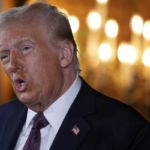
Two weeks after his disastrous debate performance, President Joe Biden is struggling to silence a chorus of senior party members and major donors urging him to end his reelection campaign. Now, polling data and prediction markets are also quantifying the cost of that night to his campaign.
On the day of the June 27 debate, national polling averages between Biden and Donald Trump were tied. Since then, they have diverged dramatically. Trump now holds a 2.3-point lead, according to FiveThirtyEight polling averages.
Polls in battleground states also swung in Trump’s favor, with two states — Michigan and Wisconsin — flipping from a brief Biden lead to a slight Trump advantage, according to FiveThirtyEight polling averages. Elsewhere, Trump’s lead widened.
In Pennsylvania, the state where Biden has spent the most on political ads — about $60 million on aired and scheduled ads since early March — the gap between the two men reversed after June 27, with Trump ahead.

Poll-based forecasting models have struggled to make sense of the altered race. For example, qualitative interventions like those from former House Speaker Nancy Pelosi and Democratic donor and actor George Clooney, who on Wednesday signaled concern about Biden’s staying power, won’t show up directly in a quantitative analysis of the race.
A model published by The Economist sees Trump as a 3-1 favorite to win the November election, while FiveThirtyEight’s model still sees the race as a toss-up. That’s partly because, with the election months away, polls are a noisy measure and certain “fundamentals” — like Biden’s incumbency, for example — remain in his favor.
“There are many sources of uncertainty that need to be properly combined,” FiveThirtyEight wrote on Tuesday.
On the other hand, bettors and prediction markets have been vocal about Biden’s diminishing chances. His implied odds of victory, according to live trading on PredictIt, fell precipitously during the first half hour of the debate and continued to fall as the night wore on.

Since then, an average of several prediction and betting markets, published by RealClearPolitics, shows a similar decline, and even a wavering view on who would secure the Democratic nomination. At one point, Vice President Kamala Harris was seen as more likely than Biden.
The beneficiary of that flow: a steadily rising Trump, who these markets now see as nearly a 60 percent favorite to win the election. Meanwhile, Biden’s reelection chances have fallen from nearly 40 percent before the debate to less than 20 percent.

Biden’s biggest problem may simply be that voters think he’s too old — and the older he gets, the more they think so. Fifty percent of registered voters think his age is “such a problem that he’s not capable of handling the job of president,” according to a New York Times/Siena poll conducted the week after the debate; that’s up from 45 percent the week before.
As Clooney wrote of his friend Biden in The New York Times this week: “The only battle he cannot win is the one against time.”
With information from News Agencies
Source: https://www.ocafezinho.com/2024/07/11/quao-ruins-sao-os-numeros-das-pesquisas-apos-o-debate-de-biden/

